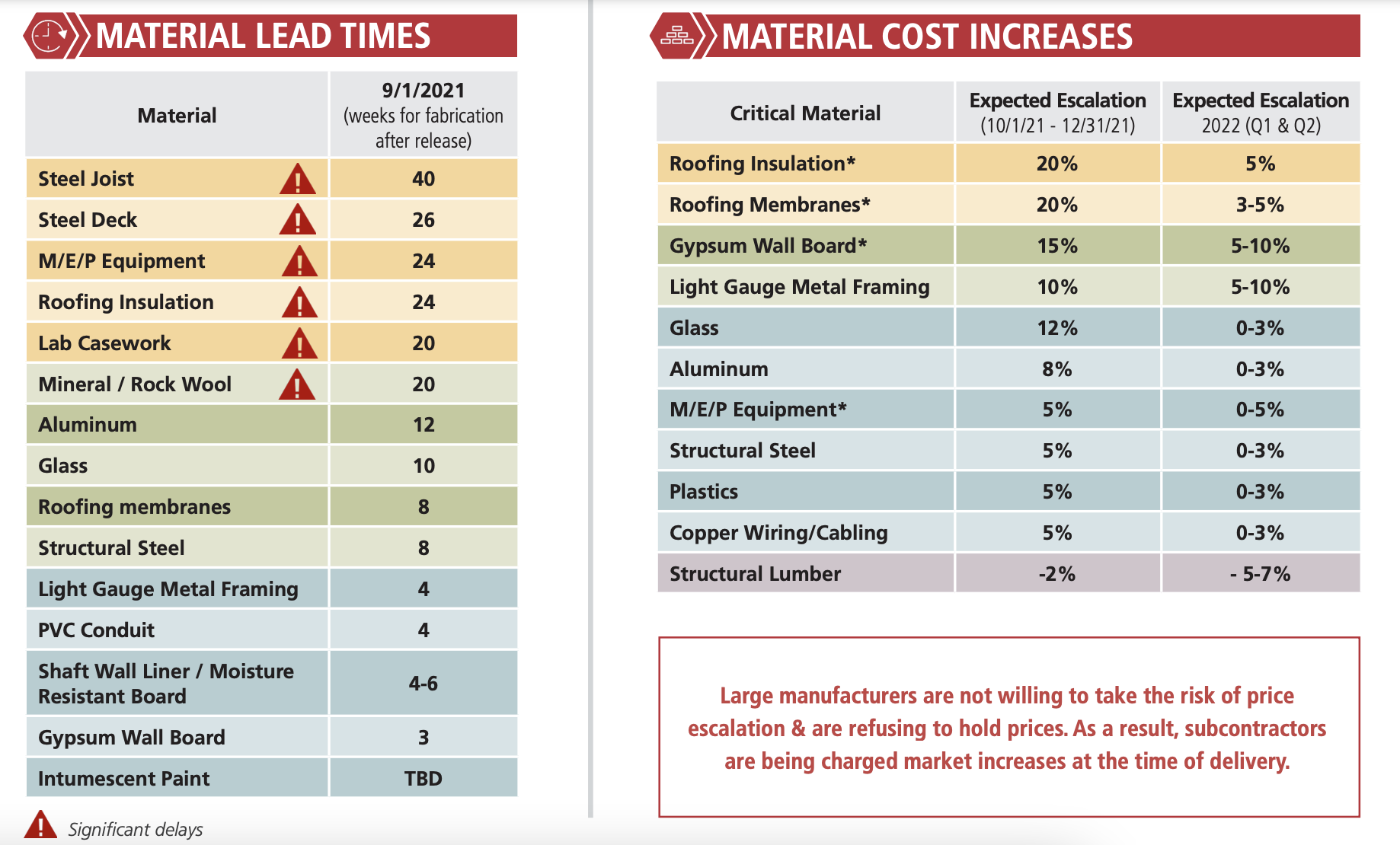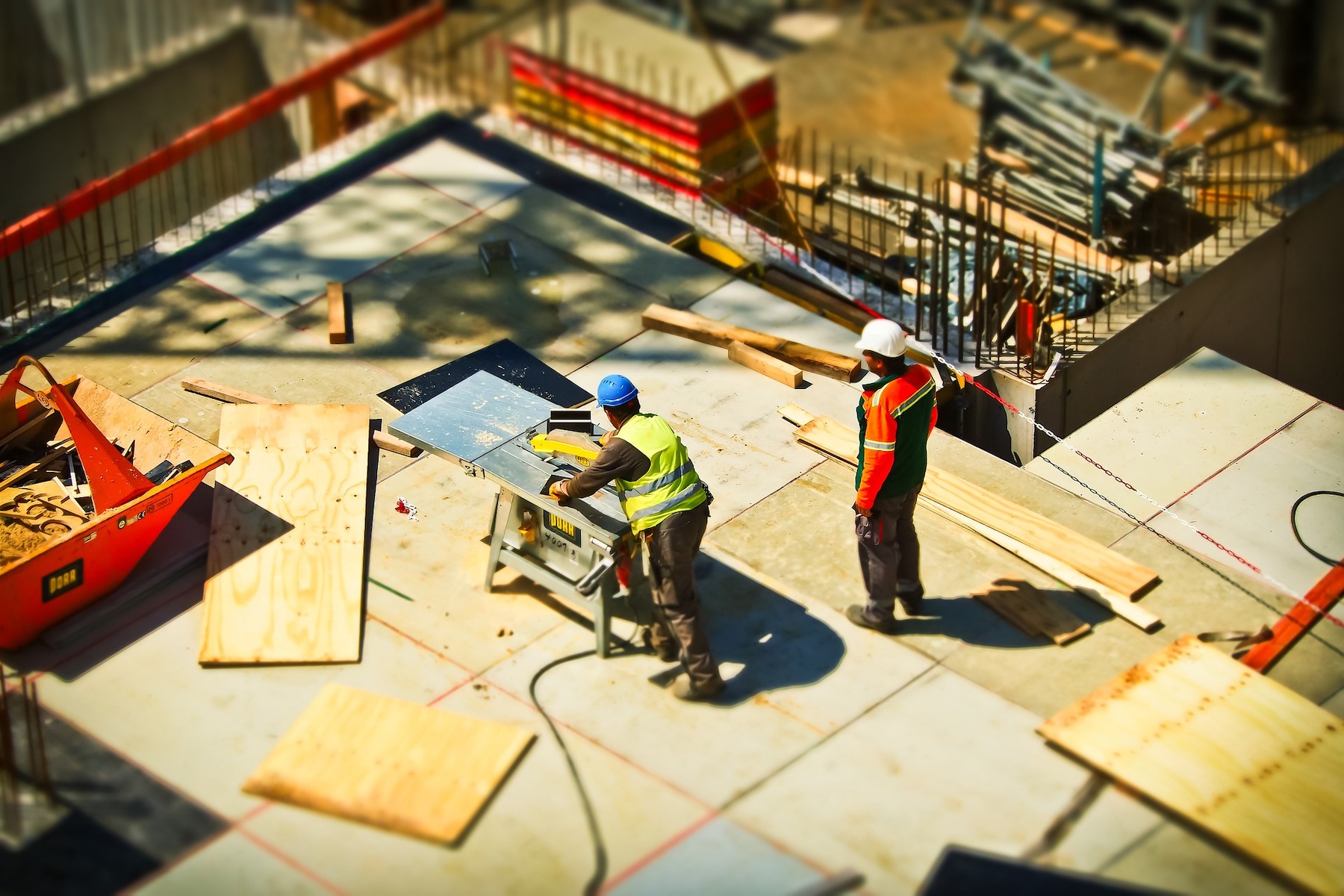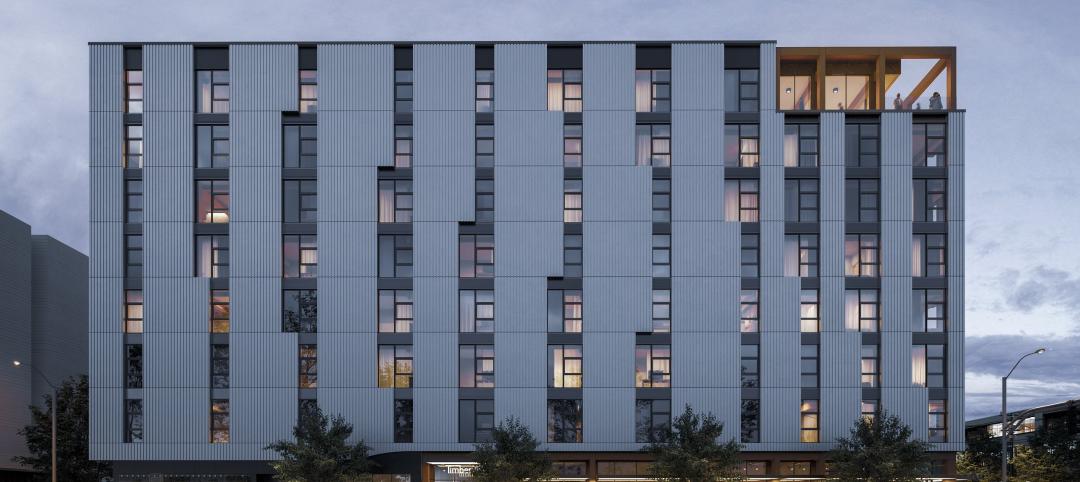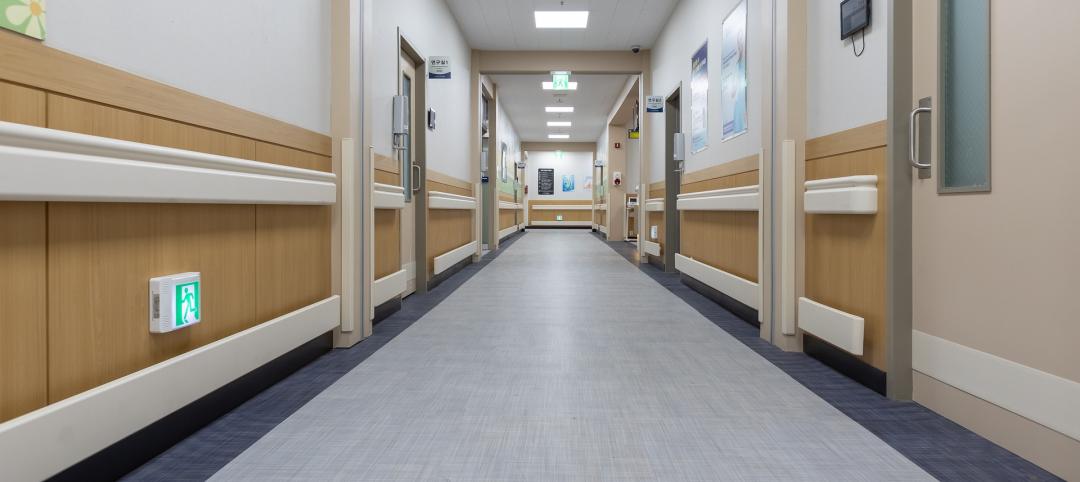The good news: the cargo and transportation snags that have encumbered building material availability this year showed signs of finally easing in September.
The bad news: the lack of material supply and increasing demand for labor are keeping prices high, to the point where manufacturers aren’t willing to hold price quotes for more than a week, if at all.
That, in a nutshell, is the state of the construction market, which the general contractor Consigli lays out in its Market Outlook for October 2021. The Outlook, written by the firm’s Director of Purchasing Peter Capone and Vice President of Preconstruction Jared Lachapelle, sends up red alerts about the availability of six product categories—steel joist, steel deck, MEP equipment, roofing insulation, lab casework, and mineral/rock wool—whose lead times for fabrication after release, as of Sept. 1, ranged from 20 to 40 weeks, with steel joists having the longest wait time.
The Outlook reports a 12 percent average price escalation for the 15 building materials tracked, and anticipates another 3 percent bump through the final quarter of this year. Roofing insulation, roofing membranes, gypsum wallboard, light-gauge metal framing, and glass exceed the overall averages.
As a result of large manufacturers not willing to take risks on escalating prices. “subcontractors are being changed market increases at the time of delivery,” states the report.

MANAGING RISK TAKES DISCIPLINE
Consigli’s strategies for risk management include:
•lock in prices with subs that are willing to share risk
•buy in bulk quantities whenever possible
•consider alternative supply sources
•implement stringent quality assurance and control measures
•focus on weekly materials delivery verification
•pre-purchase and warehouse materials
•identify peak manpower needs
•utilize prefabrication that takes labor off site
•partner with trades through design-assist
Consigli thinks labor shortages could get worse in the second half of next year. The severity will depend, in part, on vaccination mandates at a time when a sizable number of construction workers still refuse to be vaccinated. But even a fully vaccinated workforce might struggle to keep pace with construction demand that the pending $1 trillion infrastructure bill, if passed, would further pressure.
The Outlook notes that some manufacturers are focusing their production capacities on commonly used materials like drywall and MEP equipment, which is limiting—and sometimes halting—the production of specialty products. And AEC firms need to be vigilant about maintaining compatibility and quality when manufacturers source products from alternate vendors.
Consigli sees some light at the end of this supply tunnel. Its Outlook notes that steel prices are starting to level off as production increases. But citing the National Roofing Contractors Association, Consigli also cautions that shortages in roofing materials and insulation (whose lead time right now is 24 weeks) will continue through next year because of raw materials supply issues.
Related Stories
Mass Timber | May 8, 2024
Portland's Timberview VIII mass timber multifamily development will offer more than 100 affordable units
An eight-story, 72,000-sf mass timber apartment building in Portland, Ore., topped out this winter and will soon offer over 100 affordable units. The structure is the tallest affordable housing mass timber building and the first Type IV-C affordable housing building in the city.
K-12 Schools | May 7, 2024
World's first K-12 school to achieve both LEED for Schools Platinum and WELL Platinum
A new K-12 school in Washington, D.C., is the first school in the world to achieve both LEED for Schools Platinum and WELL Platinum, according to its architect, Perkins Eastman. The John Lewis Elementary School is also the first school in the District of Columbia designed to achieve net-zero energy (NZE).
Healthcare Facilities | May 6, 2024
Hospital construction costs for 2024
Data from Gordian breaks down the average cost per square foot for a three-story hospital across 10 U.S. cities.
MFPRO+ Special Reports | May 6, 2024
Top 10 trends in affordable housing
Among affordable housing developers today, there’s one commonality tying projects together: uncertainty. AEC firms share their latest insights and philosophies on the future of affordable housing in BD+C's 2023 Multifamily Annual Report.
Retail Centers | May 3, 2024
Outside Las Vegas, two unused office buildings will be turned into an open-air retail development
In Henderson, Nev., a city roughly 15 miles southeast of Las Vegas, 100,000 sf of unused office space will be turned into an open-air retail development called The Cliff. The $30 million adaptive reuse development will convert the site’s two office buildings into a destination for retail stores, chef-driven restaurants, and community entertainment.
Codes and Standards | May 3, 2024
New York City considering bill to prevent building collapses
The New York City Council is considering a proposed law with the goal of preventing building collapses. The Billingsley Structural Integrity Act is a response to the collapse of 1915 Billingsley Terrace in the Bronx last December.
Student Housing | May 3, 2024
Student housing construction dips in the first quarter of 2024
Investment in college dorms dipped slightly in the first quarter of 2024, but remains higher than a year ago.
Contractors | May 1, 2024
Nonresidential construction spending rises 0.2% in March 2024 to $1.19 trillion
National nonresidential construction spending increased 0.2% in March, according to an Associated Builders and Contractors analysis of data published today by the U.S. Census Bureau. On a seasonally adjusted annualized basis, nonresidential spending totaled $1.19 trillion.
K-12 Schools | Apr 30, 2024
Fully electric Oregon elementary school aims for resilience with microgrid design
The River Grove Elementary School in Oregon was designed for net-zero carbon and resiliency to seismic events, storms, and wildfire. The roughly 82,000-sf school in a Portland suburb will feature a microgrid—a small-scale power grid that operates independently from the area’s electric grid.
AEC Tech | Apr 30, 2024
Lack of organizational readiness is biggest hurdle to artificial intelligence adoption
Managers of companies in the industrial sector, including construction, have bought the hype of artificial intelligence (AI) as a transformative technology, but their organizations are not ready to realize its promise, according to research from IFS, a global cloud enterprise software company. An IFS survey of 1,700 senior decision-makers found that 84% of executives anticipate massive organizational benefits from AI.

















